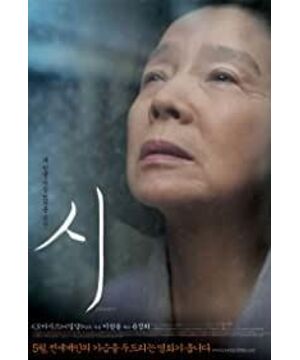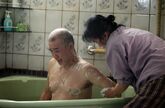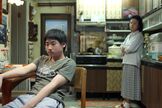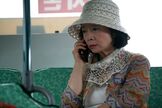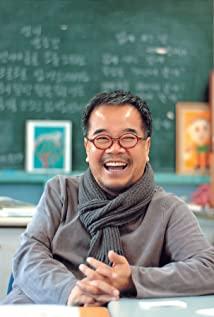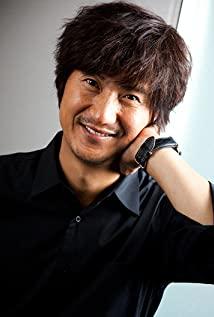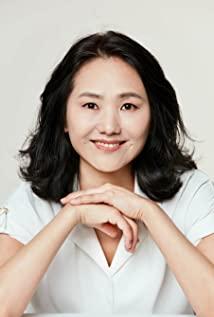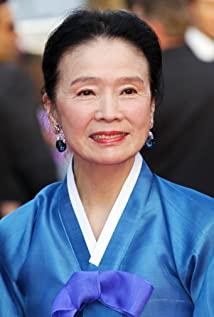It is said that poets are sensitive, sensitive to beauty, and sensitive to ugliness. If they are really poets, they should not be able to bear the huge ugliness and sins in this world. So the true poet in this chaotic world became a rare animal.
Moss can't grow in dirty air, the same is true.
For real poets, if they live in a privileged environment, where a strong person puts them in a relatively isolated environment, or they have achieved fame with their talents in the early years, it would be okay. But most people, who don't have such a life, want to seek food in this spooky world, but they have a slender heart, and they really suffer every day.
The Meizi in Li Cangdong's "Poems" is just such a person.
She loves beauty, loves to dress up, always treats the world with a passionate heart (or a girlish heart, depending on how you think of her), and she also signs up for a choir in addition to a hard life, and sits under a tree to observe the tree. The shape of a small book at any time draws out the inspiration for recording moments. But she had to face the crime of her grandson. This crime had such a great impact on her sensitive heart that when she faced the victim's mother, she couldn't open her mouth to beg for forgiveness.
After Auschwitz, writing poetry became a kind of barbarism, which is probably what I meant.
The impact of the film lies in the fact that the director uses "poem writing" and "death of a girl" as two intertwined clues. The "beauty" of the former and the "ugliness" of the latter constitute an unbearable contrast: the ugliness of the latter It’s not just the ugliness of the teenagers themselves, but the kind of indifference they show afterwards that they have nothing to do with others’ pain; it is also the treatment of the teenagers’ parents, the school, and the media (the media seems to have also been paid silience), all The discussion revolved around how to use "money" to gag.
Faced with such ugliness and sin, Miko's inner suffering has no words to express. The left hand is to write poems to write the teachings of the true feelings of the heart, and the right hand is the obsession of poetry to pursue "beauty". In the unreconcilable contradiction, it is no wonder she can only ask over and over again: Why can't I write poems? In fact, it is not that there is no talent, but that the left and right hands are too fierce. (The ability to write a poem in the end is also related to the inner relief after doing what you think is correct)
At this time, I watched "The Juvenile Murder on Guling Street" again. Profound movies always have something in common. The tragedy of Xiao Si'er lies in treating the world with a young heart and idealized moral standards. When the world slowly revealed its true face before him, his inner world collapsed, and his anger turned into self-destruction and destruction. The power of others.
In "The Poem", except for Miko, no one can write a poem;
In "Guling Street", those who uphold the standards of truth, kindness, and beauty (father, junior, Hani) are suffering and passing away early in the past. Those who do not ask for morality but only ask for self-interest live calmly and lively.
After going through the world, how can you return and still be a teenager? The real boy died eight hundred times early.
Yang Dechang wants to use this story to talk to everyone. Is the boy wrong, or the world is sick?
I also thought of "Ben Ming Year" many years ago, a very good film, Jiang Wen played a seemingly bastard, but a virgin with both physical and spiritual levels, the role of a catcher in the wheat field. The previous films were still keen to discuss the theme of "the world is going down", the Hamlet-style classical tragedy. No more than it is now, it is a firm materialistic world outlook, and the economic foundation determines the superstructure. The most beautiful retrograde after a huge disaster, lwl, who is Cai Li?
Back to the movie. There are a few interesting points. One is the role of the policeman, the external dirty and vulgar, the internal morality and cleanliness-this may also be the reason why Miko is determined to ask him for help. There are few pens, but the explanation is very clever; the other is the old man served by Miko, looking back At one point, I wondered whether Miko's promise to his request was deliberately playing the game? Judging from the director's tendency, I would rather understand that she was out of "pity" and "good deeds" (which happened after she went to mourn the suicide of a girl). Third, why did Miko reveal the settlement after paying the settlement fee, instead of choosing to do so in the first place? I think one is that I want to help that mother get compensation, and the other is that I don't want to involve other teenagers. All these deliberations reflect her kindness.
Li Cangdong's movies, including "Burning" and "Miyang" before, are extremely popular. Personally, he is characterized by a strong humanistic thought; he is very good at expressing the suffering of characters, and always discusses how people can "help themselves" after encountering great misfortune, grief, and suffering. Religion is obviously not his favorite. The answer he gave in "Miyang" is the relationship between people, a little bit of "sunshine" in the secular world; in "The Poetry", his answer is not shielding. Different flows and taint (you can compare the answer in another Han movie, Bong Joon-ho's "Mother"). There is a ubiquitous poetry in his films, focusing on white space, and there are a lot of seemingly irrelevant idle pens and freehand shots outside the narrative line. It's not to give new words to stress the kind of worry, but to face the unbearable, dirty, and sinful in life, and release a little warmth after the bone-chilling cold, giving people a trace of free and detached power. In this movie, the poem plays a similar role and forms an intertextuality with each character. I am especially impressed by this sentence:
Don't kick the burnt soot rashly. Have you ever been that hot person? (There are several translations for ms, I wonder if this is accurate?)
In the end, I really feel that those who are quiet and peaceful and prosperous should read "Poetry" and ask whether they should be grateful for this "great" era, or should they be grateful that the disaster has not happened to them? Is it a kind of hypocritical cruelty to be quiet and good in such an era?
View more about Poetry reviews


